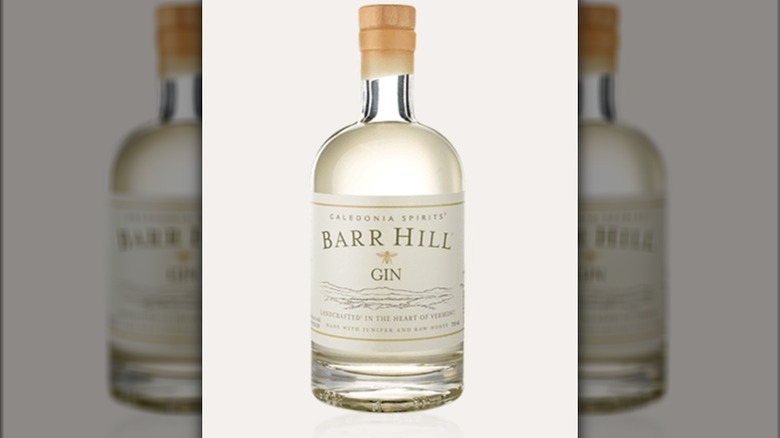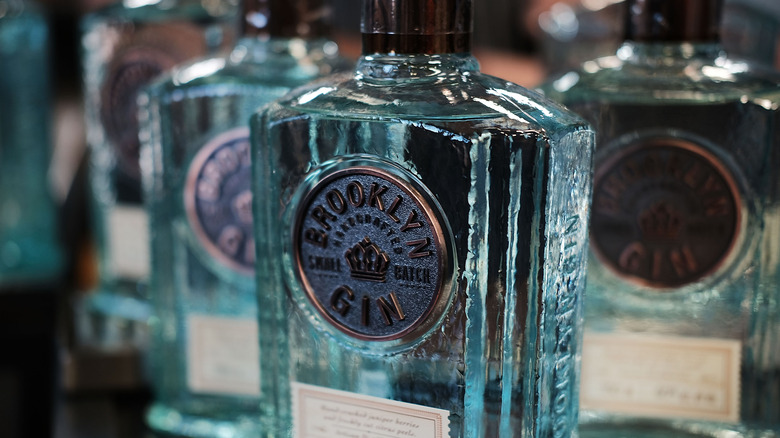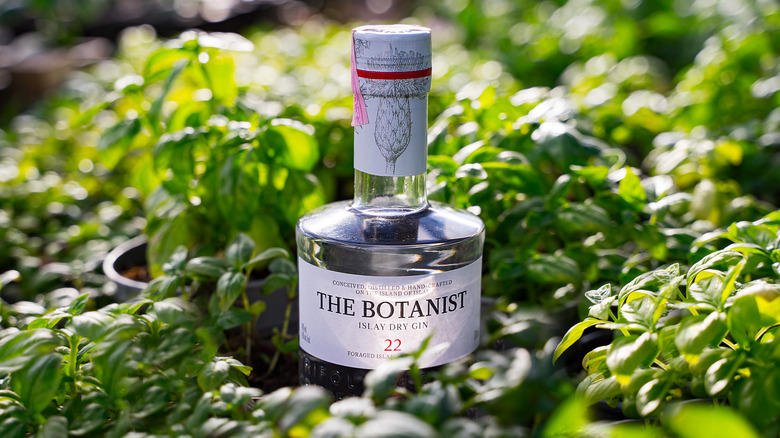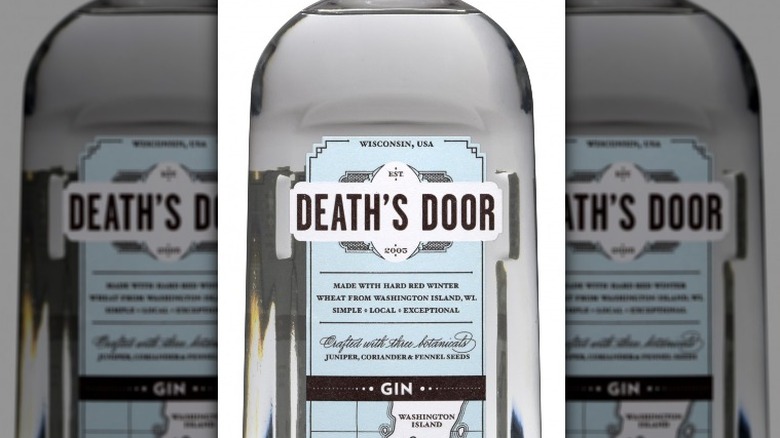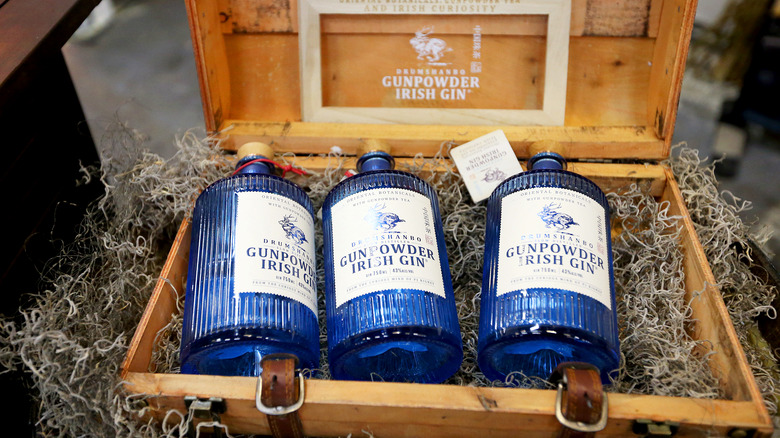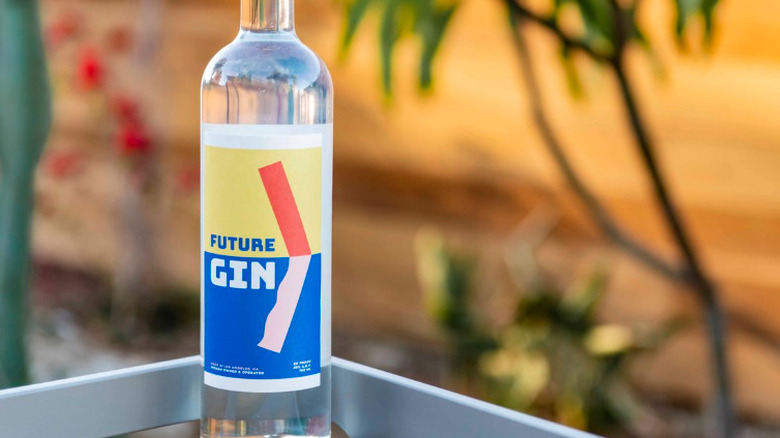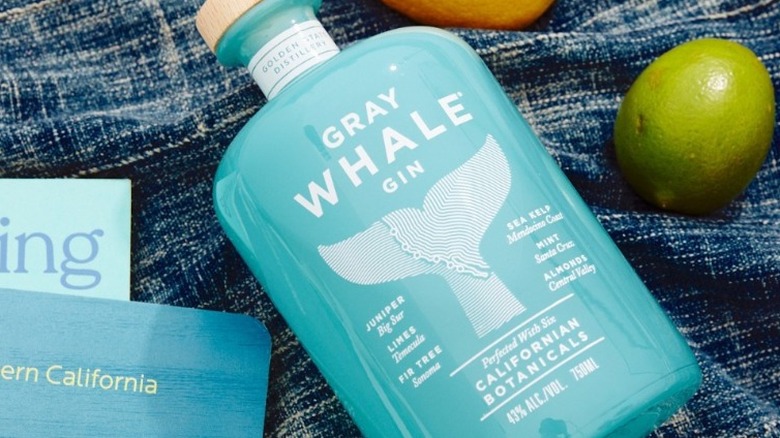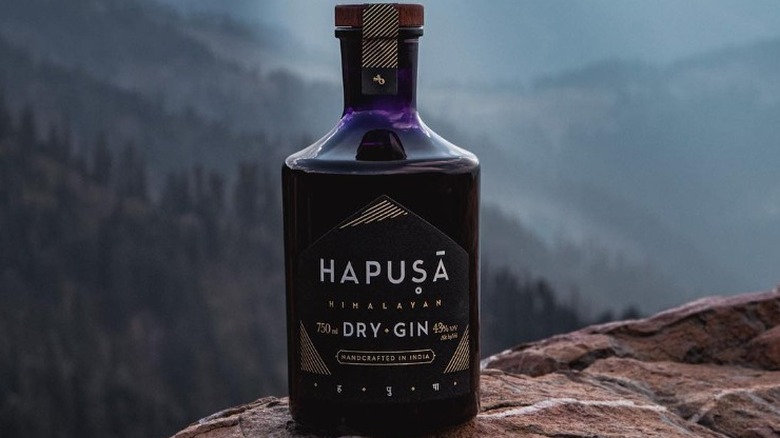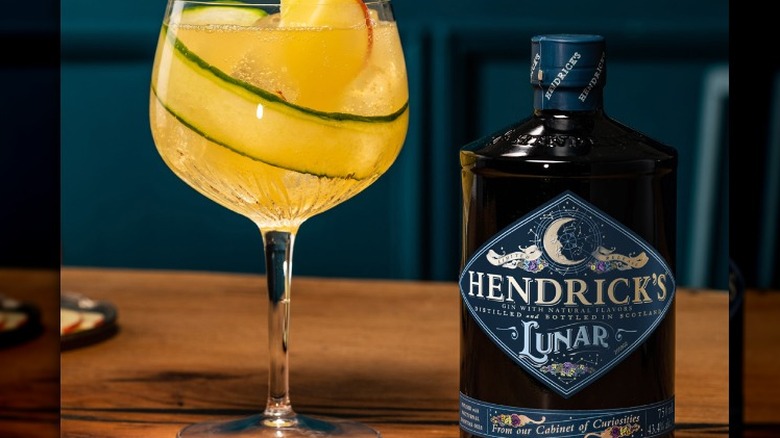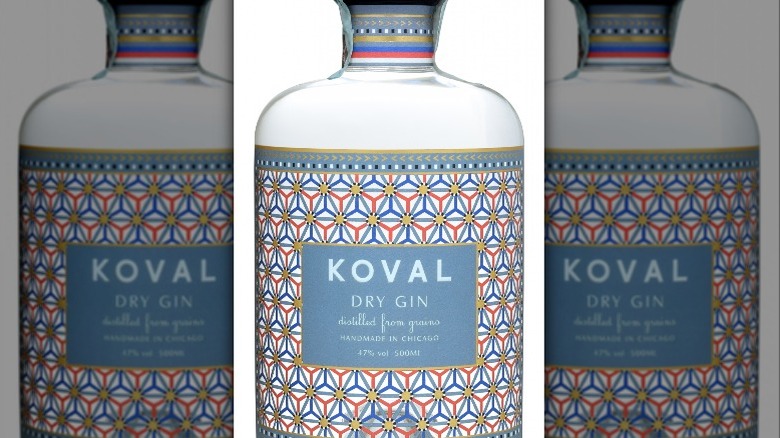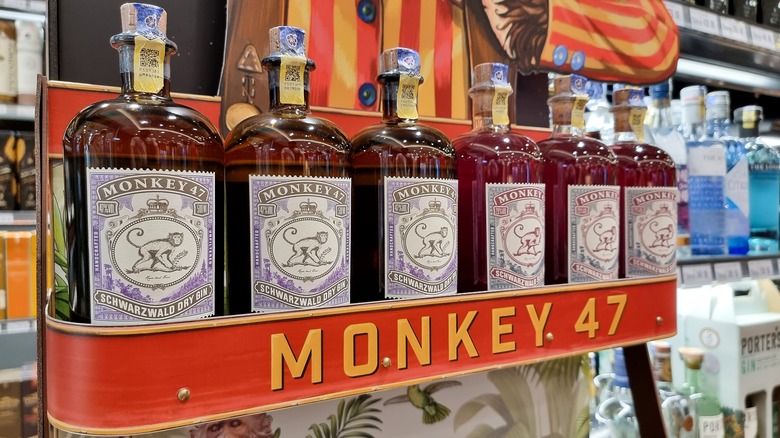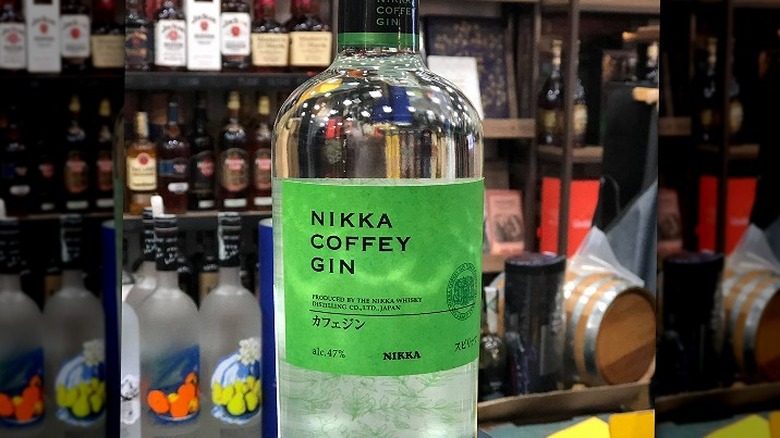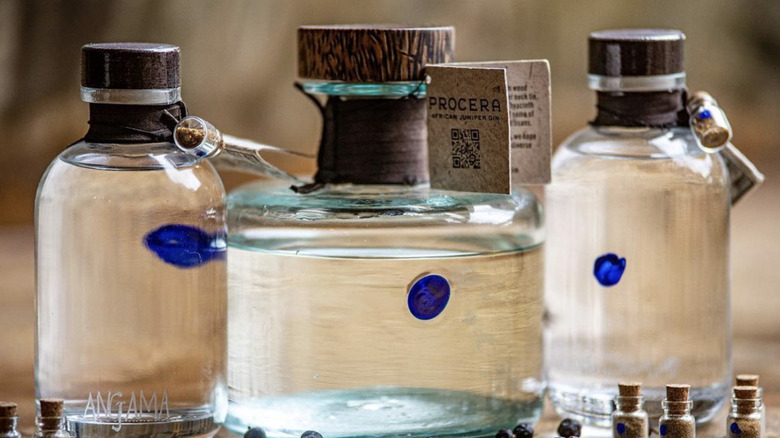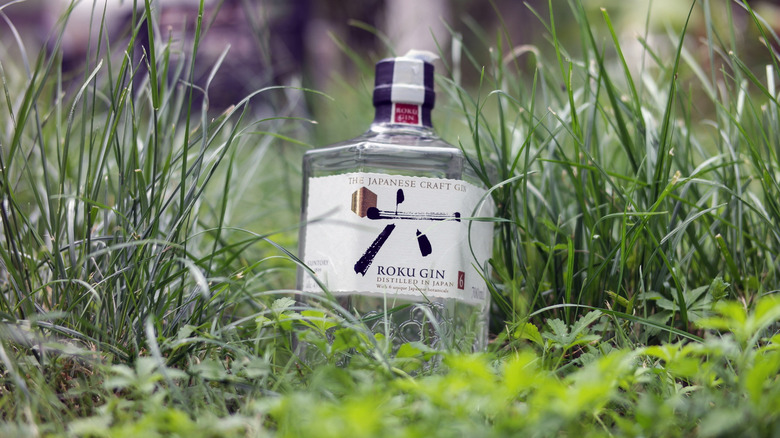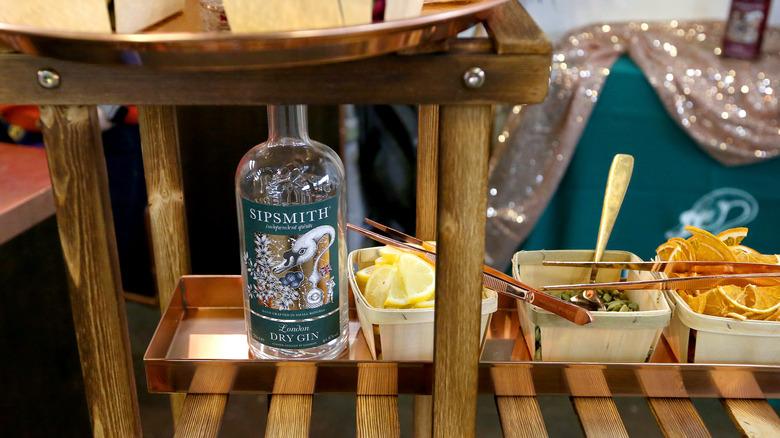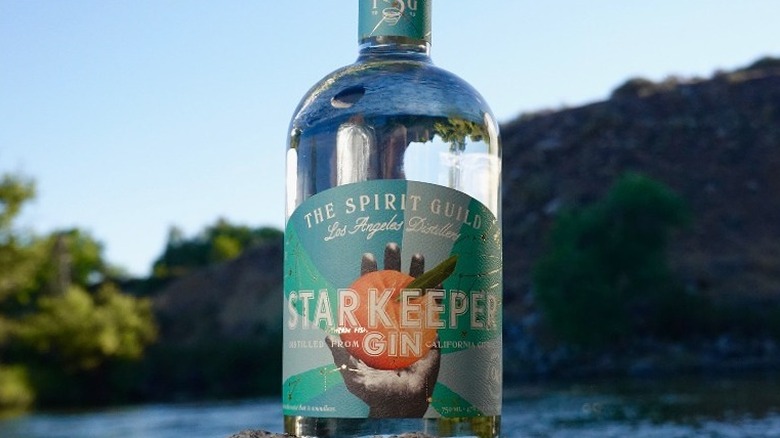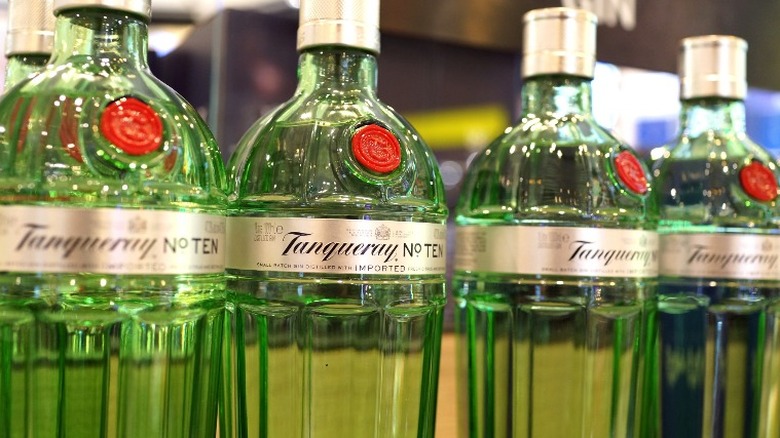20 Best Sipping Gins Of 2022
Gin does, admittedly, have a bit of a reputation. It still boasts the nickname "mother's ruin," acquired in the mid-18th century as the alcohol of choice for the masses. It was cheap, and it was strong, but its taste was of little consequence. And then there were those who thought the difference between vodka and gin was simply juniper flavorings. Fortunately, today's gin renaissance has had the opposite effect on this long-suffering quaff. In fact, the craft gins of our time don't just make exceptional cocktails; they're also extraordinary alone (or with two cubes and a garnish, as prescribed by Livemint), just like Scotch or whiskey. This is arguably the best way to experience all the botanicals that went into your chosen spirit.
With the enormous diversity available, there's a gin for every taste. As it again gains traction, albeit in a much more refined and respectable way, sipping gins is well and truly establishing itself in the market. While whiskey was the most recent alcohol to see an enormous surge in popularity, gin sales are catching up quickly. According to Beverage Dynamics, the category has risen 22% in sales since the beginning of the pandemic, both with bartenders and home consumers. There's a lot you should know before taking another sip of gin, not least of all is which bottle goes best all by itself.
Aria Gin
Described as being somewhere between a London dry and a Plymouth-style gin by Portland Monthly, Aria Portland Dry Gin, hailing from Oregon, combines botanicals that include juniper, lemon, cubeb berry, orris root, grains of paradise, and coriander, all of which are fairly typical ingredients in gin. However, where Aria differs, according to distiller Ryan Csanky, is the inclusion of water from Portland's own Bull Run river during and after distillation giving it a distinct richness on the palate and softness in the mouth.
The use of 10 classic botanicals will make this a more approachable gin for those who want to try sipping something easy or are just beginning to drink gin. The inclusion of juniper still gives you the traditional gin taste but with a gentler, more rounded finish.
Barr Hill Gin
From a Vermont distillery called Caledonia Spirits that boasts a beekeeper as one-half of the production team, Barr Hill Gin is obviously going all in when it comes to honey as the main attraction. The addition of juniper and other botanicals keeps this spirit tasting like a traditional gin but a more delicate version of anything you might be used to (as per Vinepair) with appealingly gentle, fruity notes.
Keep in mind this isn't a honey-based spirit. Don't go looking for sugary Drambuie vibes where there aren't any — but you might find it has a sweeter finish than other gins on the market. While Barr Hill might not be the gin for someone who eschews change, it will appeal to those who appreciate the attention to detail and commitment to the region that Barr Hill exhibits in its products.
Brooklyn Gin
Brooklyn Gin is for lovers of citrus. No, seriously. It's packed with citrus (fresh peels of lemon, lime, clementine, orange, and even some kumquat) and juniper flavors, so you best be a big fan. This makes it remarkably fresh tasting and means you can stray from the ubiquitous lime garnish. Even with all that citrus, or more likely because of it, this libation is considered well-balanced and vibrant by Which Gin and easily stands up to sipping. Add an ice cube and a slice of orange for something just a little chic.
While Brooklyn Craft Works is currently located outside of Brooklyn, a distillery is being built in Gowanus, Brooklyn, in order to live up to its namesake while distilling this brightly crisp gin sipper.
The Botanist
Made by Scotch distillers on the Isle of Islay, The Botanist is created in a rescued and resuscitated copper still named Ugly Betty and utilizes a decent handful of botanicals (22, all hand-foraged from the Hebrides, according to the label), but that's just part of the story. Bruichladdich distillery got into the gin game by experimenting with bog myrtle, lady's bedstraw, gorse, white clover, hawthorn, water mint, and other berries and herbs to make a seriously smooth gin. Remarkable in a location renowned for Scotch, certainly.
In a review by The Gin Is In, the quantity of botanicals is noted favorably as having an excellent balance rather than a "kitchen-sink" quality. It gives the spirit a particularly gentle nuance that comes through beautifully when tasted neat. As you might expect from a distiller with Bruichladdich's credentials, The Botanist is a well-made gin that retains a connection to the past.
Death's Door
A simple mix of, get this ... only three botanicals. That's right, this uncomplicated dram relies solely on juniper, coriander, and fennel, making it pretty easy to assume that the contents of the bottle might also be rather basic. But that's absolutely not the case. There is certainly robustness here, with all three components appearing in equal measure on the palate. Much like the gin itself, the distiller, Dancing Goat, isn't big on words and doesn't give much more information on its website. Reviewers have been quite taken by it, and The Rum Howler blog found it to have a nice equilibrium between the juniper, floral, and citrus from the coriander and a whisper of licorice from the fennel.
And before you get ahead of yourself, the gin's name comes from the area of Wisconsin where the distillery is located. Death's Door Passage is the passage of water between Washington Island and Door County. Provenance is not a prediction, folks.
Drumshanbo Gunpowder Gin
Everything about this interesting gin is imbued with romanticism and an irrepressible sense of worldly mysticism. The logo is a dashing jackalope, and the founder is presented as a restless world traveler with an insatiably curious mind, self-described as a "boundary-pushing begetter" by the distiller Drumshanbo. Distilled in Drumshanbo, Ireland, it claims a total of 12 botanicals that include meadowsweet, juniper, anise, coriander, citrus, and the namesake gunpowder tea, all gathered on PJ Rigney's travels.
While it does rely on gin's big three ingredients — juniper, citrus, and coriander — the strength of this beauty comes from Chinese gunpowder tea. Gunpowder tea is more than just your run-of-the-mill green tea. Rolled into tiny pellets, it adds a lush, smoky boldness (as per The Tea Spot) that adds to the exceptional finish. Reviewers from Bevvy also lauded the slightly floral nose and mild minty flavors, highlighting this sipper's well-rounded palate.
Four Pillars Rare Dry Gin
Australian gin isn't yet commonplace, but it's quickly getting there. Four Pillars Rare Dry gin revels in its role as a modern ginsmith, especially in the context of its Healesville, Victoria location, which is mostly known for wineries. Distilling gin since 2013, Four Pillars offers this delight in a line-up of Rare, Rarer, and Rarest Dry gins. (Rarer is kumquat heavy, while Rarest relies on bergamot for its heady flavor.) Rare is the first and, by the company's admission, a favorite as a classic sip.
Another fantastically citrus-based gin, it does well in cocktails but excels when served with just a perfect cube of ice. The Gin Guide also recommends a garnish of orange or grapefruit; honestly, we wouldn't dream of disagreeing. The juniper is there, certainly, but this one is citrus and spice through and through.
Future Gin
A review from The Infatuation for this female and LGBTQ-owned distillery mentions, on more than one occasion, how much this gin tastes like a sunny afternoon in Southern California. Full of bright ingredients like honeysuckle, grapefruit, avocado leaf, and lemony coriander, plus the star of the show, Meyer lemon, we're willing to agree that this claim to fame is a bright one. The sweet citrus from the Meyer lemon gives this gin a little lift, like sparkling sunlight. We think this makes a gorgeous sip when combined with a little ice and a twist of peel.
Made in California by a group of four forward-thinking women, who also donate 10% of sales every year to social causes they believe in, Future gin's founders are committed to social change and improving environmental practices. All that while making a bevvie that represents home? We'll make ours a double.
Gray Whale Gin
Want to support an inspiring environmental backstory with your dram? Golden State Distillery founded Gray Whale gin to recognize the beautiful migration that actual gray whales have been making for 30 million years. Every botanical (six in total) is harvested along the California coastline following the gray whales' journey, from almonds to juniper, to sea kelp, to limes. Everything is hand-foraged or sustainably sourced, keeping the company's ethos. It has also partnered with Oceana and 1% For The Planet to help protect both the California coastline and its namesake sea creatures.
A classic gin that starts with herbaceous juniper and citrus, a Gray Whale review from Bishop's Cellar highlights the umami notes provided by the kombu kelp and the lovely creamy finish from the rich almonds.
Hapusa Gin
Using the Sanskrit word for Himalayan juniper, Hapusa Gin is named for its most important addition. For most gin consumers, juniper is a definitive ingredient, but here, it's based on a specific and fairly elusive type of berry. Straying from the more traditional Indian gin flavors (like garam masala), Nao Spirits, based in Goa, instead uses hand-foraged Himalayan juniper, raw mango, cardamom, ginger, and turmeric to create this distinctive alcohol. And the distiller's very own serving suggestion? Straight, right from the freezer or depths of mountain snow.
A tart taste is well matched by floral and fruity notes and a smoky finish (as per Lifestyle Asia), making it an interesting addition to your gin collection. Himalayan juniper is considered to be widely used in Ayurvedic tradition, according to The Hindu, meaning that this little beauty might also have some nutritional upsides, too.
Hendrick's Lunar Gin
You can't consider yourself an aficionado of modern gins without knowing about Hendrick's. The truth about Hendrick's gin, as we know it, is that the brand stands out in every way. Hendrick's is eye-catching, wildly unique, and so on-trend that it almost hurts. But when you're truly lush, you can look however you want, darling. Hendrick's might not be to everyone's taste, but this offering from South Ayrshire, Scotland, is still a truly good gin. Actually, Hendrick's makes a number of delightful gins, but we quite like the company's Lunar gin for sipping.
Made by Yorkshire scientist-turned-master distiller Leslie Gracie, Lunar was inspired by the changes in the fragrance of her garden as day turned to night. She gave the gin a warmth and spice from black pepper, loads of floral essences, and a spike of citrus, according to Master of Malt, making it perfect for sipping late into the night, under the stars.
Koval Gin
The review from Paste Magazine makes it clear that we shouldn't be diluting our sipping gin, not even in a martini, and especially not this beauty. Try it with ice if you like, but know that this is one of the only gins on our list that came in with the review that it's unequivocally best just on its own. Chicago's Koval Distillery takes pride in the gorgeousness of the spirit, inside and out. As Koval is made from only a few local woodland botanicals, including juniper, wildflowers, and citrus, it's got a pretty slim flavor profile. In fact, Koval is one of our picks with the fewest ingredients, but this doesn't stop it from being one of our faves.
This isn't a London Dry gin; rather, the spirit's floral fruitiness, citrus burst, and slight hints of juniper shine instead of the expected boldness, all of which are happily embraced by Wine Dharma. Give this one a try, with or without ice.
Monkey 47 Gin
First off ... buyer beware. Many of the reviews we read for this delightful spirit contained a variation of bemoaning that the bottle is too small for something so utterly sippable. Like the house that gives out full-size chocolate bars at Hallowe'en, bigger is always better when the good stuff is involved. However, these reviews also agree about something else; this German gin is spectacular. Doubling down on The Botanist's 22 botanicals (and then some), Monkey 47 boasts 47 botanicals, including woodruff, scarlet bee balm, spruce shoots, and nutmeg foraged just outside the distillery's Black Forest property.
Reviewers on Falviar also lauded its boldness that doesn't overwhelm and mentioned that this spirit is a good match for someone who likes a stronger flavor but isn't tied to traditional gins, likely because of the inclusion of lavender and molasses.
Nikka Coffey Gin
A gorgeous entry from Miyagi, Japan, Nikka Coffey gin is described by the distillers as "bright and zesty," which sounds divine to us. Rich with juniper, angelica, and coriander, this gin also boasts four different kinds of Japanese citrus as well as apples and sansho peppers. The name Nikka Coffey might be recognizable if you're familiar with Japanese whisky, so it's no surprise that this gin is just as spectacular.
Expect a well-developed citrus sip here. All that yuzu, kabosu, and amanatsu were cultivated to play on your tastebuds. Reviewers also noted the herbal and fruity/floral layers as well. The Japanese Bar reveled in the luxuriousness of it all, noting that one of the best parts of drinking this beauty straight was the exceptionally long and clean finish.
Nolet's Silver
Made in Schiedam, Netherlands, by a 300-year-old distillery, Nolet's Silver is one of the brand's newest additions and unlike any other gin on this list. The unabashedly modern flavor profile relies on Turkish rose, white peach, and raspberry rather than juniper or citrus, making it less astringent or bitter. This also makes it an excellent choice for someone who dislikes gin based on its (mostly) unfounded mouthful-of-pine reputation.
Spirits Review goes so far as to call it a "fruit bomb," which reads like something we would love to taste on a sunny day, especially when looking for a spirit that only needs a touch of ice. As expected, it's full of fruit and floral flavors, making it a bit of an out-there choice but one we heartily recommend, nonetheless.
Procera Gin
A bit of an outlier on this list, Procera is an African gin made in Kenya's first craft distillery from African juniper and a handful of other botanicals from the continent. Presented in utterly stunning, hand-blown glass bottles with only a blue dot for identification, this beautiful spirit is made specifically to be sipped neat, according to the distillers themselves. An ice cube (or, at the very most, in a martini) receives a begrudging nod, but neat is the way to go here.
Only offering 1,000 bottles a month, everything about this Nairobi-produced gin is made by hand, from the zebra wood stopper to the attached bottle of infused sea salts for a quick little lick after sipping, according to Tatler Asia, like tequila body shots for those oozing class.
Roku Gin
In recent years, Japan has come into its own in the production of western-style spirits. Whiskey, certainly — though, companies like Suntory have been producing whiskey for nearly a century. According to Men's Journal, it might not have been until Bill Murray made it a household name that consumers truly started to explore the Japanese versions of Western spirits in earnest. But that doesn't mean these producers only started making top-notch products when the West started paying attention. Japanese gin is unique, and Suntory developed Roku gin with all the attention to detail and timeless craftsmanship that Japan has been renownedly capable of for centuries.
Named Roku (six in Japanese), this gentle spirit contains six botanicals that idealize Japan's four seasons, including sakura, green tea, and yuzu. Only containing a hint of juniper and other traditional gin botanicals, it might not thrill old-school gin snobs. Still, as Distiller says, its smoothness makes it an exemplary modern gin that uses local ingredients.
Sipsmith Dry Gin
Perhaps one of the first craft distilleries that can be credited with the renaissance of gin (or gin-aissance, as the company likes to say), Sipsmith's London Dry gin is easily one the most traditional gins on this list and serves as its inaugural gin since its creation in 2009. It will likely appeal to those looking to keep one eye on the past while venturing toward something new. A lovely sipper, England's Sipsmith is still a London Dry, so it'll be bolder than others on this list.
Good Gin-tentions mentions that this spirit might have been eclipsed by newer gins, as far as uniqueness goes, but it retains an impressive balance and smoothness enhanced by a nuttiness not found in many other modern gins.
Star Keeper Gin
In a truly inspired twist, The Spirit Guild's Star Keeper (formerly Astral Pacific) gin is made from a base is mashed clementines instead of one of the more traditional ingredients. According to its website, this allows the distillery to produce a classic gin while adding more flavor and sweetness to the finished product. It also uses plenty of junipers, pink peppercorns, pistachio, coriander, and cinnamon to create a warm contrast to all that sweet citrus.
Distilled in Los Angeles, this spirit has a recognizably quintessential Californian palate while being both familiar and out of the ordinary (via K and L Wines). The freshness imbued by the clementine base makes this gin terrific for sipping, with or without ice, say ... on a sunny afternoon?
Tanqueray no. 10
Partial to the originals? Tanqueray, distilled in Fife, Scotland, since 1830, is the house gin for many of us. Tanqueray no. 10 is a step up — one that you might not have considered. This version includes loads of fresh citrus (rather than just peel, which is more often the case) and a handful of chamomile, according to the company. This gives the bevvie a foothold over the original for sipping, making it perfect for mixing with nothing more than just ice and a squeeze of pink grapefruit.
Drink Spirits asserts that Tanqueray no. 10 was designed to be smoother and less bitter than the original, making it a solid sipping choice when you're looking for something classic ... your parents will approve, and so will everyone else.


